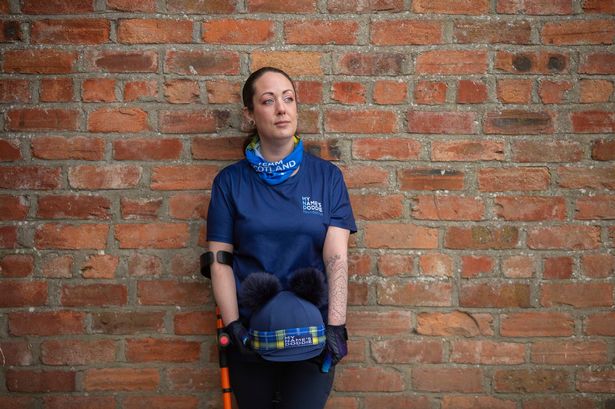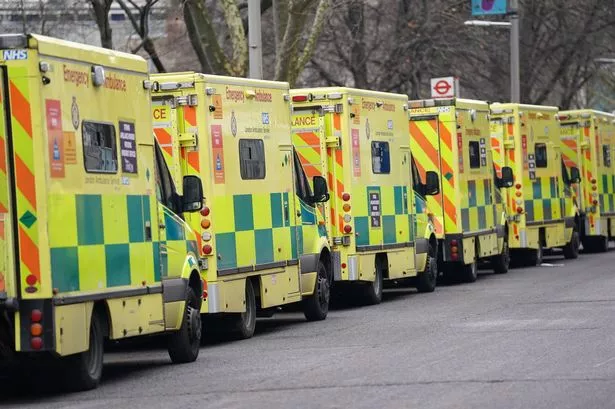Sheree Gregg, a former nurse from Inverness, recalls how she attended a lecture on motor neurone disease (MND), unaware that she was already living with the condition.
Sadly, this life-changing illness cut short her nursing career, her passion for playing guitar in a band, and her dreams of seeing the world. Now 34, Ms Gregg revealed she was in denial when symptoms first emerged during her university days.
She recounted: "I remember sitting in the front row during that lecture. My left arm was already weak, and my muscles were twitching. It felt surreal, like the lecturer was describing exactly what was happening to me, but I couldn’t bring myself to say anything."
READ MORE: Experts 'really excited' about new way of treating inflammatory skin conditions such as eczema
At just 28 years old in 2019, her diagnosis made her the youngest individual with MND in the Highlands and among the youngest in Scotland.

Her own research in the library, poring over medical journals, pointed to MND time and again, but she resisted acknowledging it.
"I spent hours in the library, looking up symptoms in medical journals, and MND kept appearing. But I ignored it. I didn’t want it to be true."
Understanding the science behind MND offered no comfort as Gregg grappled with the stark difference between theoretical knowledge and the lived reality of the disease.
"Knowing the science behind MND gave me a clear picture of what was happening to my body."
"But that didn’t make it easier. Learning about a disease in theory is very different from living with it."
In the UK, MND is diagnosed in six people daily and generally leads to a life expectancy of two to three years post-diagnosis.
The disease began to manifest while Gregg played in a punk band; her affected hand struggled to keep pace with the music.
She lamented the loss of her musical identity: "Music was a huge part of who I was."
"I’d played live since the age of 15, and I loved performing, the energy of being on stage, and the connection with the audience. Giving it up was heart-breaking, but I had no choice."
She had to give up driving two-and-a-half years ago, now relying on her mother Linda, 62, a retired nurse who is now her carer, and her father Jim, 63, who still works as a full-time plant operator. Ms Gregg said: "My diagnosis made me feel like I was failing at my job, and that was devastating because nursing was my passion."
"Losing my ability to drive took away a big part of my freedom. It’s difficult to explain just how much that impacts your life. It’s the small things you lose – cooking, cleaning, washing, things everybody may take for granted."
"My parents have been amazing, but it’s hard for them."


Despite living with MND, Ms Gregg completed a 10K at Loch Ness this year, and still enjoys video games as the charity My Name’5 Doddie Foundation gave her a grant which allowed her to adapt her controllers.
She also enjoys horse riding and finds her weekly lessons therapeutic. She said: "Horse riding has been a real turning point."
"It’s my happy place every week. It’s helped me regain some muscle strength, improve my posture, and feel a sense of freedom I thought I’d lost."
"The horse is essentially my legs – it can run when I can’t. It’s therapeutic and gives me a sense of progress and accomplishment."
"I have a slow progressing form of MND, and doctors have said my horse riding is helping me live better with it."
Ms Gregg shared her story ahead of Doddie Aid 2025, crediting the charity for helping her to turn her life around despite her diagnosis. Doddie Aid was set up in 2021 to raise funds for the My Name’5 Doddie Foundation, the charity founded by the late Scotland and Lions rugby player Doddie Weir following his diagnosis with MND in 2016.
The annual exercise challenge, which begins on January 1 and runs for five weeks, was started by Weir’s 1997 Lions team-mate Rob Wainwright and has so far raised £5 million for research into a disease that will affect one in 300 people during their lifetime. Ms Gregg said: "Organisations like MND Scotland and My Name’5 Doddie Foundation have been a lifeline."
"They provide grants, support groups, and take so much stress off our shoulders."
"I didn’t know much about Doddie Weir before my diagnosis, but I’ve come to appreciate what an incredible man he was."
"He raised so much awareness and funding for MND research. I wish I’d had the chance to meet him."
"I’ve gone through the grief cycle many times, and only recently have been able to accept my diagnosis."
"I’ve met so many wonderful people in the MND community, but losing them is incredibly hard. Many fought tirelessly to raise awareness and funds."
"We need more research and more funding to find a cure. Doddie Aid 2025 is the perfect opportunity for everyone to contribute."
"There isn’t much that can be done following an MND diagnosis right now, but that will change. There is hope, and it’s up to all of us to make that hope a reality."
To get involved with Doddie Aid 2025, visit doddieaid.com.




















